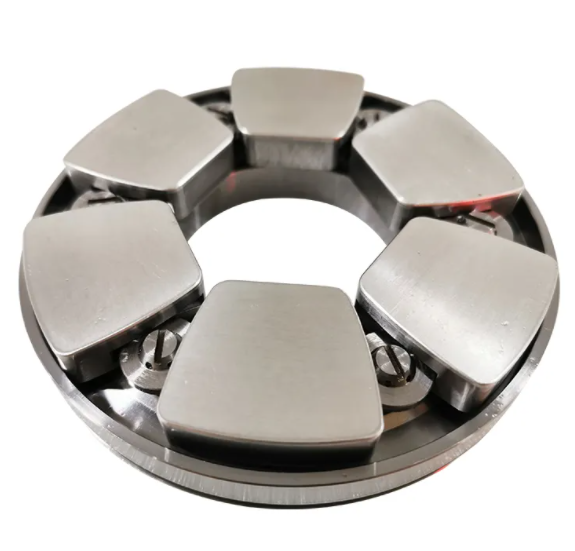Thrust pad bearings are critical components in various industrial and mechanical systems, designed to support axial loads while ensuring smooth operation of rotating machinery. This article will explore the basics of thrust pad bearings, their functions, features, and common applications. ## Understanding Thrust Pad Bearings Thrust pad bearings, also known as tilting pad thrust bearings, are a type of bearing specifically engineered to handle axial loads. Unlike radial bearings that manage radial forces, thrust pad bearings are tailored for forces along the shaft’s axis. Their unique design ensures excellent load distribution and minimal friction, making them an ideal choice for high-performance machinery.
### Key Features of Thrust Pad Bearings
1. **Tilting Pads**: The bearing consists of multiple pads that can tilt independently. This design adapts to varying load conditions, minimizing wear and optimizing performance.
2. **Hydrodynamic Film**: A thin layer of lubrication forms between the pad and the shaft, reducing friction and preventing metal-to-metal contact.
3. **High Load Capacity**: Thrust pad bearings are built to handle heavy axial loads while maintaining stability.
4. **Temperature Resistance**: Advanced materials and lubrication systems enable these bearings to operate efficiently under high temperatures.
## Functionality of Thrust Pad Bearings
Thrust pad bearings primarily serve to manage axial loads in rotating machinery. As the shaft spins, the tilting pads create a hydrodynamic wedge of lubricant that carries the load. This reduces mechanical stress, enhances efficiency, and extends the lifespan of both the bearing and the associated equipment.
## Applications of Thrust Pad Bearings Thrust pad bearings are widely used across various industries due to their robust design and ability to handle demanding conditions.
Common application areas include:
- **Turbines**: Both steam and gas turbines rely on thrust pad bearings for stability and performance under heavy axial loads.
- **Compressors**: Industrial compressors benefit from the bearing’s ability to manage axial forces, ensuring smooth operation.
- **Pumps**: High-performance pumps, particularly in oil and gas industries, depend on thrust pad bearings for reliable functioning. - **Generators**: Electric generators use these bearings to maintain shaft alignment and reduce wear.
## Advantages of Thrust Pad Bearings
1. **Enhanced Efficiency**: By reducing friction, these bearings improve the overall efficiency of machinery.
2. **Durability**: Their sturdy design ensures a long operational life, even in high-stress environments.
3. **Precision Alignment**: Thrust pad bearings maintain precise alignment of shafts, reducing the risk of mechanical failures.
4. **Versatility**: Suitable for various industries, these bearings offer flexibility for diverse applications.
## Conclusion
Thrust pad bearings are indispensable in modern mechanical systems, providing reliable support for axial loads while minimizing friction and wear. Their innovative design, combined with high load capacity and versatility, makes them a go-to choice for industries ranging from energy to manufacturing. By understanding the core functions and benefits of thrust pad bearings, businesses can ensure optimal performance and longevity for their equipment. Whether you’re working with turbines, compressors, or pumps, investing in high-quality thrust pad bearings is crucial for maintaining operational efficiency and reducing maintenance costs.


